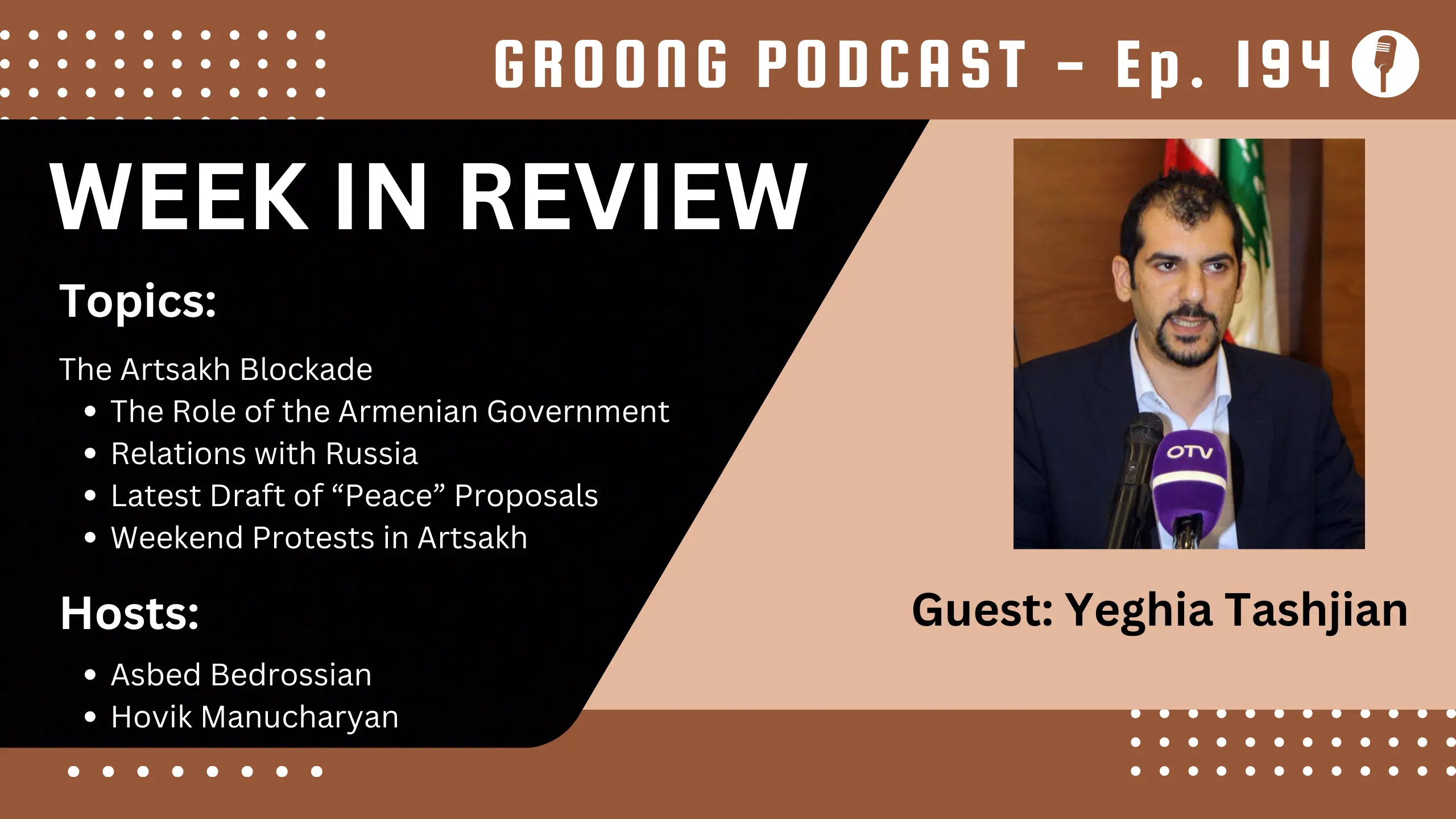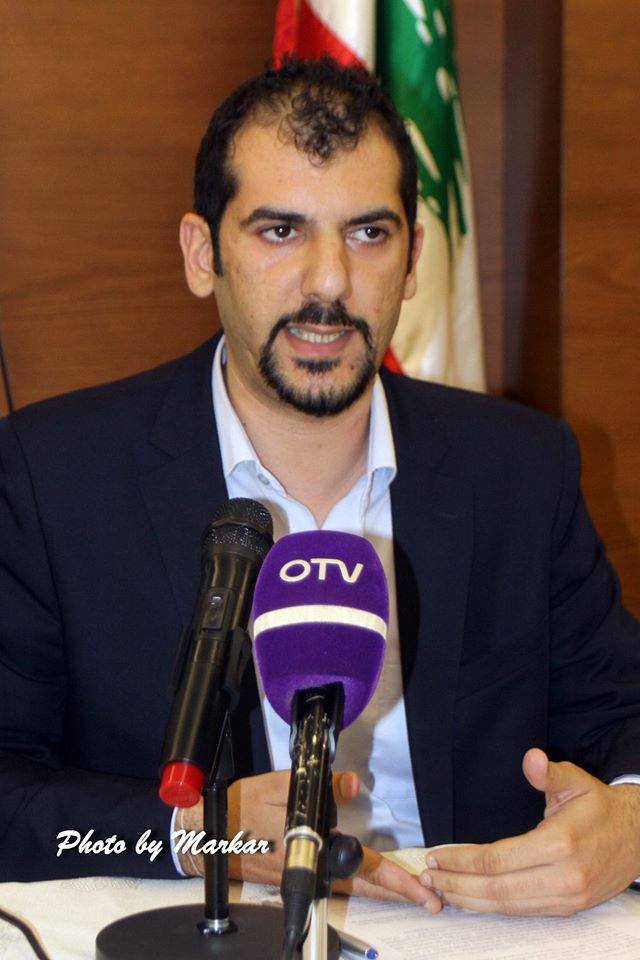
Guest:
Topic:
- The Artsakh Blockade
- The Role of the Armenian Government
- Relations with Russia
- Latest Draft of “Peace” Proposal
- Weekend Protests in Artsakh
Episode 194 | Recorded: December 26, 2022
Show Notes
For the past two weeks now, we’ve been covering the Artsakh blockade almost daily in our podcasts and videos, so let’s take a step back from the daily trauma, and look at the drivers behind the crisis.
We know that the Russian peacekeepers have been put in a very precarious position by the Turkish-Azeri alliance, which is taking advantage of a time when Russia is tied up dealing with its war in Ukraine and needs to play soft with them in order to not open additional fronts in the global Russia-West conflict. I’d like to ask a two tiered question:
- How is Russia doing?
- What is your assessment of the job that the Russian peacekeepers are doing around Artsakh during this crisis?
Role of the Armenian Government
Mostly, the Armenian government has been on a global diplomatic offensive during the Artsakh blockade. Last Monday the UN security council convened at Armenia’s request to discuss the situation in Artsakh. We heard a lot of statements from UNSC members bemoaning the crisis, urging the reopening of the Lachin corridor, but what we didn’t hear was condemnation of Azerbaijan or resolutions by the UNSC mandating remediation.
- Why didn’t Armenia introduce a draft resolution, despite having the right to do so as a party to the discussion?
- What role should the Armenian government be playing in overcoming this crisis?
Relations with Russia
Russia’s statement at the UNSC was particularly neutral, perhaps even pro-Azerbaijani. Russia portrayed the blockade as more of a conflict over mining rights, and not a violation of the November 2020 tripartite statement.
Then on Friday, a meeting of the FMs of Armenia, Azerbaijan and Russia was scheduled in Moscow, and the agenda was to continue negotiations over this so-called “peace deal”, but Ararat Mirzoyan bailed out at the last moment. So it was just Lavrov and Bayramov who met, and it was clear that Lavrov was pretty pissed.
- Some analysts praise Mirzoyan’s snub of Lavrov & Bayramov as a sign of newfound independence. Do you agree with the move?
- The relations with Russia are not good. Where are they headed?
I found one thing that Lavrov said notable: he blamed Armenians for not allowing the Azerbaijani so-called protesters access to the Kashen mine, maybe hinting that previously there was an agreement to do so. My thought all along has been: what is there to talk about allowing Azerbaijan to see the mines in Artsakh? Artsakh is its own country. And Artsakh’s official stance is that, on their part, they want to inspect mines that recently fell under Azerbaijani control.
- Do you think there’s been a deal to allow Azerbaijan to inspect Artsakh’s structures, operations, etc?
Armenia’s “Peace Proposal”
As we noted earlier, Armenian FM Mirzoyan did not go to Moscow on Friday, but instead Armenia officially forwarded its latest draft peace proposal to Azerbaijan. Mirzoyan indicated that if Azerbaijan accepts the latest draft then a peace treaty can be signed before the end of year. In fact, today and tomorrow Pashinyan is in Moscow to attend the informal CIS meeting.
- What do you think is being discussed in this latest draft of the so-called “peace plan”?
Weekend Rallies in Artsakh
Yesterday, Sunday, there were mass rallies in Artsakh. Tens of thousands turned out to demand freedom of movement and reopening of their link with Armenia. The rallies were organized by the government, and state minister Ruben Vardanyan addressed the protestors. He said: “I’m here, I’m fighting and I’m not going to leave or obey Azerbaijan’s conditions.”
At the same time, Just this past week Pashinyan’s former FM Zohrab Mnatsakanyan said that “Remedial Secession” is now a necessity for Artsakh.
- What do you think is being expected from Ruben Vardanyan as the state minister of Artsakh Republic?
Some western-leaning observers think that Ruben Vardanyan was “parachuted” into Artsakh to take over as a Russian operator, sort of in the manner of Bidzina Ivanishvili in Georgia a decade ago. They think that as Ivanishvili overcame Saakashvili, so now Vardanyan is sent to overcome Pashinyan.
It’s interesting to note how virulently negative Azerbaijan’s leadership and press have been towards Vardanyan. They write everything from calling him a Russian puppet, to discussing his assassination! (of course, nobody holds them accountable for such public expressions of terrorism).
- Why is Azerbaijan so rabidly anti-Vardanyan? What are they afraid of?
Jeyhun Bayramov last week said that Artsakh officials used to be a lot more cooperative before Vardanyan was appointed minister of state.
- What has changed in Artsakh’s approach with Azerbaijan?
- Do you see Artsakh breaking away from Armenia’s foreign policy, and pursue its own self-determination? How?
- Diplomatically speaking, is Recognition of Artsakh a possibility? How would it alter the course of Artsakh’s cause? (Do you support this?)
- Does Armenia have the capacity to engage in military operations today
Topics from the Panelists
- Yeghia - Lebanese currency joyride
- Hovik - Insensitive, insolent Armenian leadership. And their wives.
Wrap-up
We hope you found our Week in Review helpful. We invite your feedback and your suggestions, you can find us on most social media and podcast platforms. Thanks to Laura Osborn for the music on our podcasts.
Guests

Yeghia Tashjian
Yeghia Tashjian is an regional analyst and researcher based in Beirut, with expertise in China’s geopolitical and energy security interests in Iran and the Persian Gulf. Currently he is an instructor in International Affairs at the American University of Science and Technology and International and Regional Affairs Cluster Coordinator at the Issam Fares Institute for Public Policy and International Affairs at the American University of Beirut.
Hosts

Hovik Manucharyan
Hovik Manucharyan is an information security engineer who moved from Seattle to Armenia in 2022. He co-founded the ANN/Groong podcast in 2020 and has been a contributor to Groong News since the late 1990s.
Disclaimer: The views expressed by Hovik Manucharyan on the ANN/Groong podcast are his own and do not necessarily reflect the opinions of his employer or any other organization.

Asbed Bedrossian
Asbed is founder of the Armenian News Network Groong and co-founder of the ANN/Groong podcast.